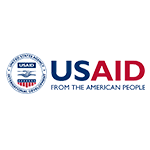Protecting Women from Malaria During Pregnancy
HIGHLIGHTS
- Pregnant women who live in malaria-endemic areas have an elevated risk of contracting the disease.
- Intermittent preventive treatment (IPTp) is a standard and recommended good practice, but providers do not always follow IPTp during antenatal care visits.
- We partnered with the Ministry of Health of Côte d’Ivoire to develop strategies and tools that help providers systematically give IPTp. As of 2022, these solutions were in use across 285 health facilities.
The Challenge
Pregnant women who live in malaria-endemic areas have an elevated risk of contracting the disease, which creates health risks for both the woman and her fetus. Intermittent preventive treatment (IPTp) is a standard good practice recommended by the World Health Organization for protecting pregnant women and their children.
IPTp involves administering antimalarial drugs to pregnant women to treat an existing infection (if the woman has one) and protect them from new infections. But providers do not always follow the recommended regimen during antenatal care visits. We partnered with the Ministry of Health of Côte d’Ivoire to develop strategies and tools that help providers systematically practice IPTp.
Our Approach
We worked through the Breakthrough ACTION project with local partners, service providers, and health facility clients in Côte d’Ivoire to identify what holds providers back from consistently giving IPTp.
We found three primary behavioral barriers, including a lack of timely and representative feedback from clients on the services they are providing; chronic scarcity of time, personnel, and other key resources; and suboptimal choice architecture that increases the cognitive burden of compliance with the protocol or clinical best practice. Building on these insights and existing behavioral science-based interventions, we worked with local stakeholders to generate, user-test, and refine solutions that encourage IPTp.
The solutions developed include:
- A card inserted into a client’s health record book at the start of antenatal services, which prompts providers to deliver malaria counseling and treatment; and
- Certificates of provider and client achievement for those who complete recommended care are displayed at home and in the health center, serving as incentives, reminders, and social recognition for effective malaria prevention during pregnancy.
Results
In a pilot conducted in three districts, the solutions were well received by both providers and pregnant women. Providers saw the insert as a useful reminder to help them do their job well, and not an additional burden. Providers also appreciated the visual elements of the card during client consultations.
Pregnant women were enthusiastic about receiving the certificate and proud to take it home. As of 2022, the solutions were in use across 285 health facilities, with plans to scale up further across additional districts.
Takeaway
Provider behaviors are at the heart of comprehensive, quality health care. The solutions we developed respond to challenges of scarcity and choice architecture that cut across health areas and behaviors. Promising experiences and feedback from the pilot suggest that a behavioral science approach to address these challenges can support providers without generating additional burdens.
Interested in our work applying behavioral science to global health? Email gh@ideas42.org, follow us on LinkedIn, or tweet at @ideas42 to join the conversation.
Partners








